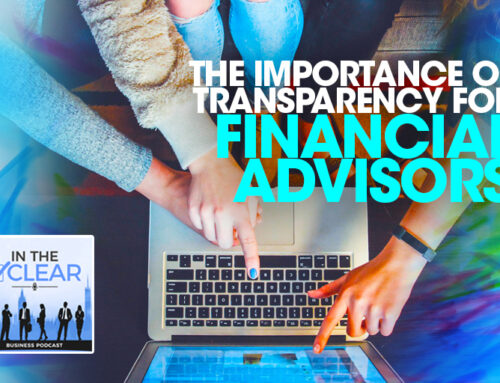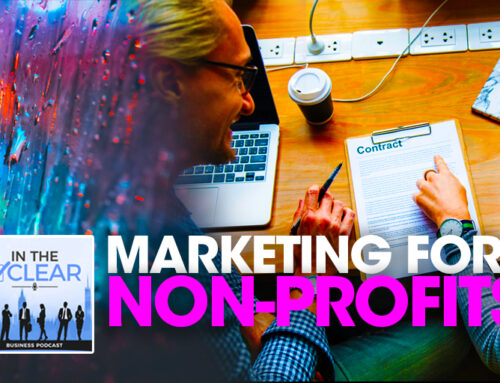 Susan Blais, leadership coach and achievement strategist, joins Justin Recla to discuss advancing leadership skills for high level CEOs. Susan started in business as a receptionist and worked her way to become the CEO of a billion-dollar division of a Fortune 100 company. Today she helps CEOs implement and understand the critical balance between relationships and results. Listen in as she discusses the skills high-level CEOs utilize to advance their leadership skills.
Susan Blais, leadership coach and achievement strategist, joins Justin Recla to discuss advancing leadership skills for high level CEOs. Susan started in business as a receptionist and worked her way to become the CEO of a billion-dollar division of a Fortune 100 company. Today she helps CEOs implement and understand the critical balance between relationships and results. Listen in as she discusses the skills high-level CEOs utilize to advance their leadership skills.
Welcome to the In the Clear Podcast. I’m your host, Justin Recla, and today we are talking with Susan Blais about advancing leadership skills for high-level CEOs.
Susan and I met at an event out in San Diego and we’ve connected a couple of times now, and she’s onto some exciting stuff. Susan, welcome to the show.
Thank you so much, Justin.
Awesome. Right before the show, we were talking about even people like Bezos and what not, that are constantly wanting to up-level and learn and find new ways to succeed. What are some of the things that you’re seeing within the executive level and leadership level of folks in business that are really continuing to up-level. What are some of the patterns that you’re recognizing?
Well, what I’m seeing in my leadership coaching is that once I start working with an executive who’s already at a very high level, they might be a CEO, a president of a company, or a CFO, and as they start to really understand their strengths and as they start to unleash even more of their potential through the coaching process, it seems almost inevitable now that eventually they get to a place where they realize, “Oh, I want to do more.”

Everybody who is a high achiever, it seems there’s never really a top for them.
Just like Jeff Bezos, like you mentioned, who is the richest man in the world and has 140,000 employees at Amazon. You couldn’t really get your career too much bigger on Earth, so he wants to go to the moon. Everybody who is a high achiever, it seems there’s never really a top for them. They always want to reach for something bigger.
Yeah, that’s so true. The next thing is that it’s just kind of the aspect of personal development. You’re either growing or you’re dying, and I think the people that continue to succeed, it’s just a continuous up-leveling of what you do. And by all means, there’s some people that get to a certain point, they get off that elevator and they build from there. But those that are really wanting success really understand that the only way to continue to move forward is to continue to learn and develop new skills.
Absolutely, and sometimes that might be … You know, there’s only, you’re right, so much vertical to go. I mean, a CEO might decide they want to run an even bigger company or they might want to kind of take a sidestep into a different industry to keep their own interests high and keep growing into a new area. But it seems that the intent to grow and just that growth factor in people that are really high achievers just does not stop and is always seeking a greater pasture.
Yeah, it’s one of those things that you could do multiple things once when you have the right keynote points. But as an individual looking to continue to evolve, we’ve got to continue to stretch ourselves. We’ve got to continue to learn and develop new skills.
That’s right, and what I find is a real key to it is the evolving self-awareness. If someone … Someone did ask me, in fact, at the event where I met you what do you think is the one critical skill for a leader? I thought about it for a moment and I said self-awareness, because it is knowing yourself and what your strengths are, what your passions are, and even the things you don’t like to do that I see now that as a leader continues to grow and evolve, that self-awareness is kind of the spark that keeps the engine going. One of the great joys in what I do is that I delight in helping executives find a little hidden room or a little hidden treasure, a strength or a passion that they weren’t even sure they had. It might have been something that they were interested in as a kid, or something that they thought about 20 years ago and haven’t thought about since, that we uncovered those, and sometimes that is the very start that sets them into a whole new direction.
Yeah, it’s true, and you know, that self-awareness piece, I love the fact that you touch upon that because I think we’re seeing such a huge shift in society and in business that, you know, the old ways of doing things, the being on auto-pilot, only can get you so far. To really, really up-level and really better yourself, better your business, better your company, whatever it might be, the only true way that I believe in that is that awareness piece, The language I’ve been using recently is self-dominion, having complete self-dominion over one’s self, and that’s having a level of awareness that most people aren’t willing to achieve because it does sometimes take a hard look at yourself, into what you’re doing and why you’re doing it and how you’re doing things.
I know for a lot of business owners, that can be a hard pill to swallow. But really, at the end of the day, if you really want to … If you’re in business to assist others, which most business owners that I know are, they have solutions and they want to make the world a better place, the only way to do that is to first start off by looking at yourself through that awareness lens.
Absolutely, and actually, I just picked up a book … I have a master’s in marriage and family therapy, and one of the fathers of that whole family systems movement, name is Ed Friedman, and I just picked up his book to reread. It’s called A Failure of Nerve.
Ooh.

Accept challenges and even failures without falling apart.
And boy, it was a real eye-opener to me again. But it’s the whole human systems theory is a lot of the basis of how I do my coaching. But it reminded me once again how the term called self-differentiation, which I think is very close to what you just said. It’s about as a person continues to grow in their self-awareness and they start to own their strengths, talk absolute 100% responsibility for everything that happens in their life, and define their boundaries very clearly with people, their leadership just blossoms. It just explodes, and they create the kind of environment around them that kind of gives other people permission or shows them the way to do that themselves, and then leadership just multiplies throughout the organization, because once people realize that the very top person has boundaries and has a self and is in control of their emotions and can accept challenges and even failures without falling apart, then it gives them permission to do the same. It is just really exciting.
Yeah, it really is. It really is. I love these types of conversations. This is some of my favorite type of topics, too, to discuss. We’re going to get ready to go on break. But before we do, can you share with our listeners where they could find more information about you?
My website is susanblais.com.
Fantastic.
If you are just joining us, we are talking to Susan Blais about advancing leadership skills for high-level CEOs, and when we get back from the break, we’re going to talk to Susan a little bit more. Stay with us.
To listen to the entire show click on the player above or go to the In the Clear podcast on iTunes.
Podcast: Play in new window | Download





